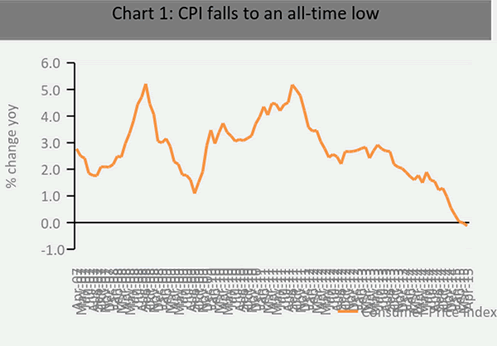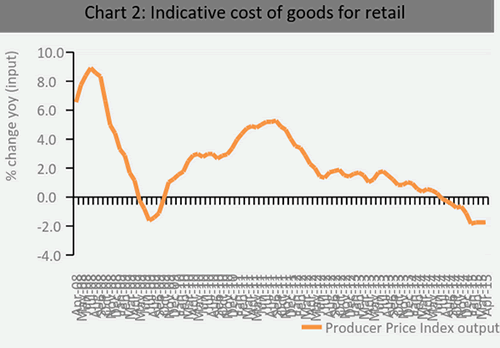UK enters deflation - first time since 1960
The UK finally tipped into deflation in April, according to the latest figures from the Office for National Statistics ONS. The Consumer Price Index fell from zero in March to -0.1 per cent in April, the first time the measure has been in negative territory since 1960.
Looking ahead, we believe deflation will be short-lived as petrol prices continue to rise and the pace of food deflation starts to moderate. The fears of deflation becoming entrenched appear to have vanished as underlying momentum in retail sales remains strong and inflation expectations well anchored. Nominal wage growth was 2.7 per cent in March and remains on an upward trajectory indicating that firms are rewarding employees after a prolonged period of subdued wage growth.
We believe a brief period of deflation, or low inflation, will be beneficial to the consumer sector as nominal wage growth continues to rise, boosting households spending power. Supported by robust consumer confidence, a stronger labour market and rising asset prices, consumer spending will benefit in the coming months.

Source ONS
In the longer term, the Bank of Englands latest forecast suggests that inflation will likely take a couple of years before it returns to its target of 2 per cent. Price pressures on the supply chain remain weak, as indicated by the Producer Price Index in Chart 2, suggesting that costs faced by retailers have fallen by 1.7 per cent compared with the previous year. Coupled with sterlings recent appreciation, import prices should continue to fall. A mixture of contracts and hedging should mean that cost pressures can be effectively managed for those retailers who import a high proportion of their goods especially clothing, electricals and furniture. Providing oil prices do not rise sharply, were confident that inflation should remain below the Bank of Englands target for the next couple of years which will provide ideal conditions for a gradual and measured rise in interest rates.

Source ONS
The Bank of Englands latest Inflation Report supports our view, and the markets, that the Monetary Policy Committee MPC is in no rush to raise interest rates. Judging by the two year policy horizon set by the Bank, interest rates are expected to start rising in the middle of 2016. Rates are not expected to exceed 1.3 per cent by the end of 2017.
It is worth noting that the Banks forecasts for growth were revised down from 2.9 per cent in 2015 to 2.6 per cent - following weaker than expected output for the first quarter of this year. We believe that growth, underpinned by stronger consumer spending, will accelerate in Q3 and Q4 as households continue to benefit from stronger momentum in real wages and robust labour market conditions. However, the Chancellors announcement of an emergency budget, to be held on 8 July, could inflict more pain through additional austerity measures.
Back to Retail Economic News